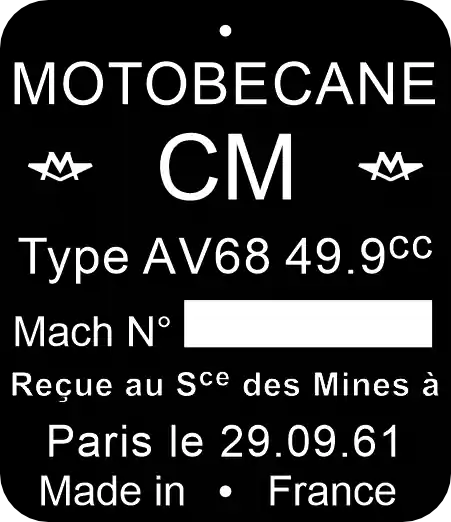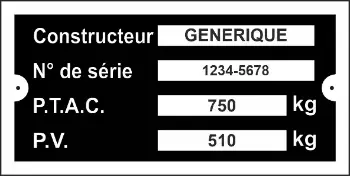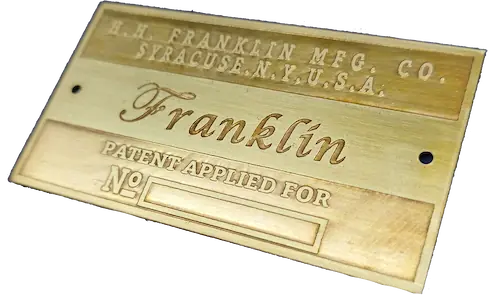Manufacturer plate, understand everything in less than 5 minutes.
At the end of this article, you will know:

Examples of manufacturer's plates, illustrative photo, source: GIPA35.
We will explore in detail what a nameplate is and its importance through different examples. We will also examine the information generally provided on manufacturer plates, explaining their meaning before answering the most frequently asked questions.
What is a manufacturer's plate?
A manufacturer's plate is a label or plate attached to a product. It allows you to know the origin, characteristics and specifications of the product. It is generally affixed by the manufacturer during production and serves as proof of authenticity and compliance with regulatory standards.
The manufacturer's plate comes in different forms, it can be metal, plastic or self-adhesive. In each of these cases, it is often permanently attached to the product, removing it is often synonymous with destroying it. It can be located in different places, depending on the type of product, but it is usually clearly visible and easily accessible.
There are different names depending on the type of plate, here are some examples:
identification plate, manufacturer label, mines plate, frame plate, chassis plate, tare plate, frame label, etc.
Why is the manufacturer's plate important?
The nameplate plays a crucial role in various fields, including the automotive industry, electronics, aerospace and many others, here are some examples:
1. Authenticity and traceability : The manufacturer's plate provides information about the manufacturer, which allows you to verify the authenticity of the product. It may also contain a unique serial number or tracking code, making it easier to trace the product throughout its lifespan.
2. Maintenance and repairs : The nameplate provides information on the technical specifications, capacities and limitations of the product. This is useful during maintenance or repairs as it helps technicians identify the correct replacement parts and make necessary adjustments.
3. Compliance with standards : The manufacturer's plate indicates the safety standards, certifications and regulations with which the product complies. This ensures that the product has been manufactured to established quality standards and is safe to use.
4. User security : The nameplate contains safety warnings, instructions for use and precautions. This information is essential to ensure user safety and avoid accidents related to improper use of the equipment.
5. Liability and warranty : In the event of a problem or defect in the product, the manufacturer's plate helps identify the manufacturer and facilitates the warranty process. It is also important to establish liability in the event of an accident or misuse of the product.

Are you restoring an old vehicle and the technical inspection is approaching?
Order your plate now, which complies with the Technical Inspection (CT) and is approved by the French Federation of Vintage Vehicles (FFVE).

The different types of manufacturer plates
1. Aluminum plates : Aluminum plates are commonly used due to their resistance to corrosion and wear. They are lightweight and durable, ideal for equipment exposed to harsh outdoor environments.
2. Brass plates: These golden plaques are renowned for their elegance and aesthetics. They are used when appearance plays an essential role, particularly for professional plates such as doctors' plates, high-end products, musical instruments or even works of art. Brass also offers excellent corrosion resistance.
3. Stainless steel plates : Stainless steel plates are known for their robustness and resistance to high temperatures. They are frequently used in the chemical and food industries. Their use being very specific and their costs high, these plates are rarely used on products intended for individuals.
4. Plastic plates : Plastic sheets are economical and generally suitable for less demanding applications in terms of environment and sustainability.
5. Adhesive manufacturer label : Self-adhesive nameplates, also known as manufacturer labels, are convenient and versatile options for equipment identification. Made from high quality adhesive materials, these plates are easy to apply to different surfaces. Although lightweight, these self-adhesive plates provide durable adhesion that withstands harsh environmental conditions.
How to read a manufacturer's plate? (With example)
First of all, please note that in our example the plate has four fields, but others may have more.

Example of trailer plate printed with manufacturer, serial number, PTAC and PV.
Here is a list of information that can be found on a manufacturer’s plate:
PV : Empty weight (in tonnes or kg) without any load or passengers. It is used to calculate the payload of the vehicle and determine its carrying capacity.
TPC Or GVW: Total Authorized Load Weight (in tonnes or kg), represents the maximum mass that the vehicle is authorized to transport, including its load and its passengers.
ACWP : Authorized Total Rolling Weight (in tonnes or kg). It indicates the maximum weight limit that the vehicle-trailer combination is authorized to transport on the road (sum of the weight of the vehicle and the trailer).
VIN: Vehicle Identification Number, or chassis number, the VIN is a unique number that identifies the vehicle and is generally made up of letters and numbers.
It allows you to trace the history of the vehicle and verify its legitimacy. we sometimes use the term WINE (Vehicle Identification Number), as in this Wikipedia article.
Other more general information may also appear there, such as:
there brand, the name and address of the maker, model, body type, pneumatic pressure, the year of manufacture or even the country of origin.
May also include some compliance standards Or technical specifications including: power, capacity, dimensions, voltage, etc.
This information may vary depending on the country of registration, some may be missing or arranged differently. We therefore recommend that you refer to the laws and regulations in force in your country to find out the mandatory elements and their provision.
FAQs (Frequently Asked Questions)
For any questions, do not hesitate to write to us: [email protected].
This article will be updated with the answers to your various questions.
A typical nameplate is usually rectangular and measures a few centimeters in width and height. It can be metal, plastic or adhesive. The content of the plate varies by product and manufacturer, but it usually contains the essential information mentioned above.
Conclusion
In conclusion, a manufacturer's plate is a label or plate attached to a product. It provides important information about the manufacturer, product specifications and compliance with regulatory standards. It plays an essential role in product authenticity, traceability, safety and responsibility. When purchasing a product, it is advisable to check the presence and integrity of the manufacturer's plate to ensure a reliable and safe purchase.
For more information on nameplates and their customization according to your specific needs, do not hesitate to contact us. We are here to meet all your industrial nameplate requirements.

Find the plate that meets your needs or have it custom made! Our plates are made in France, complying with FFVE and Technical Inspection files.



